LIBERIA
Summary of SRI Progress in Liberia
SRI was introduced to Liberia in late 2012 through Robert Bimba, national coordinator for the Farmer Union Network (FUN) of Liberia and president of the Community of Hope Agriculture Project (CHAP), a national NGO specialized in both urban and rural areas in Liberia. Bimba learned about SRI while participating in 13-country regional workshop that was organized during July 2012 by CNS-Riz and SRI-Rice in Ouagadougou, Burkina Faso. Later that year, encouraging initial trials with his family and a few farmers in Zubah Town, Paynesville, Monrovia, led to extended activities in CHAP (see video). When the national World Bank-sponsored West Africa Agricultural Productivity Program (WAAPP) SRI program was approved in late 2013, CHAP was able to organize the first training of trainers in collaboration with the Ministry of Agriculture with the support from national WAAPP coordinator Cyrus Saygbe. The workshop, which began on December 17, 2013, brought together 84 participants from different parts of Liberia, as well participants from Sierra Leone and Mali. A subsequent Agriculture Coordination Committee meeting about SRI held in early 2014 at the Ministry of Agriculture in Gardnerville, Monrovia, was attended by 48 people from the government, multi-lateral and bilateral partnerships, donors, NGOs, farmer organizations and the private sector. The "Improving and Scaling up the System of Rice Intensification in West Africa" (SRI-WAAPP) formally began in January 2014 with CHAP's Robert Bimba as the SRI-WAAPP National Facilitator for Liberia. A list of the numerous regional workshops and activities within Liberia between 2014 and 2016 are listed on SRI-WAAPP project website.
During May 2014, President Ellen Johnson-Sirleaf visited CHAP for the rice harvest. The following month she arranged for a group of 100 young people to work with Chap to increase their interest in agriculture, help out CHAP's SRI efforts, and to empower youth to earn incomes through the president's initiative. In 2014, CHAP became the lead organization carrying out an SRI pilot project for the Ministry of Agriculture and WAAPP Liberia, which is part of a regional West Africa Agricultural Productivity Program. On Feb. 12-14, 2015, CHAP hosted a National Workshop on the System of Rice Intensification in Monrovia. During June 2016, Robert Bimba gave a presentation at Cornell University on CHAP's SRI work in Liberia. SRI-WAAPP training sites in Liberia as of 2016 are shown in the map below. During late 2016, CHAP began implementing a two-year project to promote SRI, introduce labor-saving equipment, and build capacity of value chain entrepreneurs. The project, which involves 1,800 lowland rice farmers in five counties (Grand Bassa, Bomi, Grand Cape Mount, and Montserrado), is financed by the Japanese and Liberian governments through the Ministry of Agriculture (MOA) and the International Fund for Agriculture Development (IFAD). During April 2019 CHAP, in collaboration with the Ministry of Agriculture (MoA), launched the “Love Liberian Rice Campaign” during April 2019 with the aim of improving food security in the country through rice production, processing and marketing. The initiative aims to solicit a volunteer contribution of US$1 from each individual, mainly those that are engaged into agriculture activities, with proceeds generated from the campaign being used to purchase farming implements to empower smallholder farmers. Read more about CHAP's progress with SRI on their organizational website. In October 2021, the Adaptation Fund approved the SRI-based “Scaling up Climate Resilient Rice Production in West Africa” (RICOWAS) project which includes Liberia and 12 other countries in the region. In January 2022, CHAP received a UNDP grant of US$25,000 to produce climate smart agriculture seed rice in Montserrado and Lofa counties using SRI methods. During July 2022, CHAP and Alliance des Eglises et Missions Evangeliques de Guinea (AEMEG) worked together to start a SRI program (FEED la Guinea), beginning with 2 hectares and training 100 farmers in Kalalo. During 2023, the UN Cimate Technology Centre & Network (CTCN), through its network partners CARES Group Limited and INTEGRATION environment & energy GmbH, introduced a Solar Powered Irrigation Systems (SPIS) technology as part of a SRI pilot in the county of Bong, using the lessons learnt to formulate an enabling environment roadmap and a monitoring an evaluation framework for nationwide roll-out. During 2023-2024, CHAP implemented the Livelihood Innovation Food Security Entrepreneurship (LIFE) Project with funding from Irish Aid through Concern Worldwide Liberia, in which 214 smallholder farmers are being introduced to SRI; the project began in Grand Bassa during 2023 and extended to Rivercess in February 2024. The RICOWAS Project, implemented by CHAP with funding from the Adaptation Fund through the Sahara and Sahel Observatory, is on track to achieve its objectives as local governments in several project zones, including Bomi, Nimba, and Montserrado, have committed 1,500 hectares of lowland for rice production. The initiative aims to enhance rice production by building the resilience of 13,000 smallholder farmers across 2,750 hectares of lowlands in six project zones: Nimba, Lofa, Bong, Grand Gedeh, Montserrado, and Bomi.
Progress and Activities
2025 Updates
 Armed Forces of Liberia (AFL) to Incorporate SRI as Part of Military's Agriculture Company Revitalization
Armed Forces of Liberia (AFL) to Incorporate SRI as Part of Military's Agriculture Company Revitalization
 The Community of Hope Agriculture Project (CHAP) and the Armed Forces of Liberia (AFL) have entered into a strategic partnership aimed at revitalizing the military’s agriculture company and strengthening national food security. The partnership was formalized through the signing of a Memorandum of Understanding (MOU) between CHAP and the AFL High Command.
Under the agreement, CHAP will train soldiers in the System of Rice Intensification (SRI) through the RICOWAS program and support pilot rice production across three key military installations: the Edward Binyah Kesselly (EBK) Barracks, Camp Jackson (Namaa), and Toedee.
The Community of Hope Agriculture Project (CHAP) and the Armed Forces of Liberia (AFL) have entered into a strategic partnership aimed at revitalizing the military’s agriculture company and strengthening national food security. The partnership was formalized through the signing of a Memorandum of Understanding (MOU) between CHAP and the AFL High Command.
Under the agreement, CHAP will train soldiers in the System of Rice Intensification (SRI) through the RICOWAS program and support pilot rice production across three key military installations: the Edward Binyah Kesselly (EBK) Barracks, Camp Jackson (Namaa), and Toedee. CHAP is providing improved seed varieties, including the high-yield FARA 67, as well as machinery, technical guidance, and hands-on field support. Currently, two hectares of rice under the SRI method are approaching maturity at EBK Barracks, marking the first major milestone of the partnership. Once harvested, the rice will be milled at CHAP’s processing facility in Zubah Town and used to feed the military as part of the AFL’s “Force for Good” mandate. [See full LAEJN article for details.]
 STAR-P/CARI Empowers Smallholder Farmers with Climate-Smart Agricultural Practices
STAR-P/CARI Empowers Smallholder Farmers with Climate-Smart Agricultural Practices
[July 21, 2025] The Smallholder Agriculture Transformation and Agribusiness Revitalization Project (STAR-P), facilitated by the Seed Development Certification Agency (SDCA) and the Central Agricultural Research Institute (CARI), convened a five-day training from July 3–8, 2025. The workshop engaged smallholder farmers, extension officers, youth and women farmer groups, and community-based organizations. Held at CARI in Suakoko, the training focused on climate-smart agricultural practices and demonstration plots under two themes:
- System of Rice Intensification (SRI): Enhancing productivity using two upland rice varieties.
- System of Vegetable Intensification (SVI): Introducing local and exotic vegetable varieties with climate-resilient techniques.
STAR-P, implemented by CARI in collaboration with the Ministry of Agriculture and supported by the World Bank and IFAD, aims to enhance productivity and commercialization across Liberia’s rice, oil palm, and horticulture value chains. The project targets 38,000 smallholder farmers—at least 30% of them women—across all 15 counties. [See CARI article for details.]
 Rivercess and Grand Bassa Farmers Urge CHAP, Concern Worldwide to Sustain Agriculture Project
Rivercess and Grand Bassa Farmers Urge CHAP, Concern Worldwide to Sustain Agriculture Project
[June 23, 2025] Over 188 local farmers from Rivercess and Grand Bassa Counties are appealing to the Community of Hope Agriculture Project (CHAP) and Concern Worldwide to continue their farming support initiative, which they say has significantly improved their livelihoods. Speaking in an interview, the farmers emphasized that since the intervention of CHAP and Concern Worldwide—backed by Irish Aid—their communities have witnessed notable agricultural and economic transformation. The project, now in its second to third year, introduced farmers to the System of Rice Intensification (SRI), a method many initially found difficult. However, they say they have now mastered the technique and are reaping its benefits.“At first, the SRI method was tough for us because it was new. But now we are used to it. It makes rice farming easier and faster. We no longer need to move our farms every year or cut down trees,” another farmer explained.
Farmers reported that they are now able to use the same plots of land continuously, significantly reducing the labor and environmental degradation associated with traditional shifting cultivation methods. The farmers, hailing from Steward Town, James Town, and Gbediah Town in Rivercess County, as well as Guayah, Saturday, Gorgbah, Crayton, and Gaye Peter Towns in Grand Bassa County, expressed pride in taking ownership of their farms. “We are not only using the method on the CHAP farms but also on our own farms. We’re teaching our children and even other communities. Now, we’re feeding ourselves and helping others too,” they stated. With more help, we can grow more food and support even more communities,” they concluded. [For more information, see Front Page Africa article.]
 Bomi, Nimba, and Montserrado Commit Land for Rice Production Boost under RICOWAS Project
Bomi, Nimba, and Montserrado Commit Land for Rice Production Boost under RICOWAS Project
[March 5, 2025] The RICOWAS Project, implemented by CHAP with funding from the Adaptation Fund through the Sahara and Sahel Observatory, is on track to achieve its objectives as local governments in several project zones, including Bomi, Nimba, and Montserrado, have committed 1,500 hectares of lowland for rice production. The initiative aims to enhance rice production by building the resilience of 13,000 smallholder farmers across 2,750 hectares of lowlands in six project zones: Nimba, Lofa, Bong, Grand Gedeh, Montserrado, and Bomi.
Robert Bimba, Head of the Project Implementing Unit, shared updates on the project. and announced that Bomi Community College (BCC) has contributed 20 hectares of lowlands to the partnership, focusing on boosting rice production using climate-resilient methods and the System of Rice Intensification (SRI). The project has received significant support from local leaders, with special thanks extended to the superintendent, city mayor, and commissioners of Bomi and Montserrado for their efforts. This collaboration reflects a strong commitment to agricultural transformation in line with the Government of Liberia's National Agricultural Development Plan (NADP) 2024-2029 and the ARREST agenda. According to Bimba, the RICOWAS Project exemplifies the collective effort of Liberians working together to strengthen agriculture and contribute to the nation’s sustainable development. [See Promedia TV Liberia for more information.]
2024
 CHAP Ongoing SRI Rice Production Continues Despite Challenges
CHAP Ongoing SRI Rice Production Continues Despite Challenges
[October 12, 2024] Despite facing significant challenges, including flooding at key sites and high labor costs, the System of Rice Intensification (SRI) is making strides across Liberia. Efforts are underway to promote climate-resilient rice production in various counties, including Rivercess, Grand Bassa, Grand Cape Mount, Montserrado, Bong, Lofa, Nimba, and Grand Gedeh. A commendation goes to the 22,751 smallholder farmers participating in the out-grower schemes. Soon, Montserrado will see the dedication of the largest rice mill, which aims to boost production by 200 metric tons in Zubah Town and create daily employment for 50 individuals. Starting in November 2024, new rice brands and a significant supply of milled rice will be available. For more information, see Facebook post by Pro Media TV Liberia]
 SRI Methods Have Positive Impact in the LIFE Project in Crayton Town, Grand Bassa County
SRI Methods Have Positive Impact in the LIFE Project in Crayton Town, Grand Bassa County
[Juy 31, 2024] The Community of Hope Agriculture Project (CHAP) is implementing Climate Smart Agriculture under the Livelihood Innovation Food Security Entrepreneurship (LIFE) Project with funding from Irish Aid through Concern Worldwide Liberia. The project, which began in Grand Bassa during 2023 and extended to Rivercess in February 2024, is currently working with 25 smallholder farmers per community, which comprises a total of 214 smallholder farmers who are being introduced to the System of Rice Intensification (SRI) for rice cultivation.
Since the introduction of the SRI in Grand Bassa County, farmer groups like the one in Crayton Estate, have been able to grow rice twice in a year with less external inputs. The resulting SRI adoption has proven sustainable for farming thus far and is achieving high yields. With this positive impact, farmers have transitioned from forest degradation / slash and burn to sustainable and Climate Smart Agriculture. In addition to SRI production methods, CHAP has created a market for the SRI farmers’ out-grower scheme across the country in support of the “I love Liberian rice” domestic rice production in keeping with the Ministry of Agriculture’s National Agriculture Development Plan (NADP), which includes cultivation of 50,000 ha of lowland rice across the country from 2023 to 2030.
SRI methods have been steadily gaining popularity in Liberia and are now integrated in most of the local and national rice production projects/investments. These include, among others, the Community Based Forest Management Project with funding from UNDP and Swedish Government in Grand Cape Mount and Lofa, the Scaling Up Climate-Resilient Rice Production in West Africa (RICOWAS) Project, and the Rural Economic Transformation Project (RETRAP). [See Robert Bimba's report on the LIFE Project for more information.]
 Feed Liberia Campaign Launches on CHAP's Climate Change SRI-RICE Harvest Field Day
Feed Liberia Campaign Launches on CHAP's Climate Change SRI-RICE Harvest Field Day
[March 21, 2024] The Community of Hope Agriculture Project (CHAP) has officially launched its Feed Liberia Campaign on its Climate Change SRI-RICE Harvest Field Day. During the launch, the Deputy Minister for Regional Development Research and Extension at the Ministry of Agriculture, Moses Gbanyan,expressed his support for the project.The campaign aims to reduce poverty, promote domestic food production, and create jobs, in line with the Government of Liberia's ARREST Agenda. A key focus of the campaign is the transformation of waste lands into productive areas using cutting-edge technologies such as System of Rice Intensification (SRI) and Climate Resilient Rice Production (CRRP). The launch took place at CHAP's farm in Du Port Road Zubah town, where Executive Director Rev. Robert Bimba emphasized the importance of utilizing waste lands to benefit local communities. He expressed gratitude to the Government of Liberia, Jubilee Justice, the Ministry of Agriculture, Concern Worldwide, RICOWAS, Irish Aid, and UNDP for their continuous support in the agricultural sector through CHAP.
Rev. Bimba highlighted the need for Liberian farmers to maximize the use of waste lands and grow more rice in order to reduce or eliminate rice importation in the country. CHAP is actively working with hundreds of community members to create job opportunities and empower the community to feed themselves and send their children to school. During the launch, partners including Concern Worldwide, UNDP, and the Ministry of Agriculture expressed their commitment to supporting CHAP and commended the Executive Director for his dedication to the cause. [For more information see the sources of this post: CHAP facebook post and a March 25 article in the Daily Observe.]
2023
 CTCN Pilots Improved Solar Powered Irrigation Project with SRI in Bong County
CTCN Pilots Improved Solar Powered Irrigation Project with SRI in Bong County
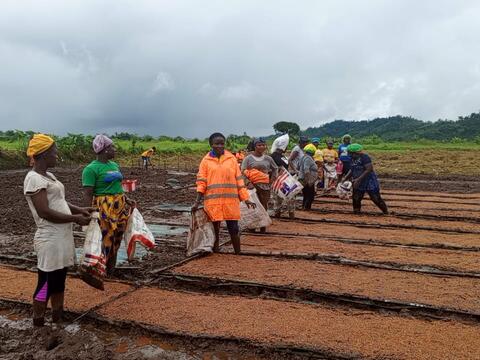 [September 1, 2023]
The Environmental Protection Agency and the Ministry of Agriculture of Liberia reached out to UN Cimate Technology Centre & Network (CTCN) to pilot innovative irrigation solutions to produce rice.
According to an article on their website, CTCN, through its network partners CARES Group Limited and INTEGRATION environment & energy GmbH, introduced a Solar Powered Irrigation Systems (SPIS) technology as part of a System of Rice Intensification (SRI) pilot in the county of Bong, using the lessons learnt to formulate an enabling environment roadmap and a monitoring an evaluation framework for nationwide roll-out.
The technical assistance relied on the involvement and the indigenous knowledge of a wide range of stakeholders such as the Africa Rice Center, Community of Hope Agriculture Project, Climate Resilient Rice Production Project in West AFRICA (RICOWAS), Liberia Rice Farmers Cooperation, civil society, and members of farmers’ cooperatives.
[September 1, 2023]
The Environmental Protection Agency and the Ministry of Agriculture of Liberia reached out to UN Cimate Technology Centre & Network (CTCN) to pilot innovative irrigation solutions to produce rice.
According to an article on their website, CTCN, through its network partners CARES Group Limited and INTEGRATION environment & energy GmbH, introduced a Solar Powered Irrigation Systems (SPIS) technology as part of a System of Rice Intensification (SRI) pilot in the county of Bong, using the lessons learnt to formulate an enabling environment roadmap and a monitoring an evaluation framework for nationwide roll-out.
The technical assistance relied on the involvement and the indigenous knowledge of a wide range of stakeholders such as the Africa Rice Center, Community of Hope Agriculture Project, Climate Resilient Rice Production Project in West AFRICA (RICOWAS), Liberia Rice Farmers Cooperation, civil society, and members of farmers’ cooperatives.With the adoption of Alternate Wetting and Drying (AWD) technology, water usage is decreased by applying crop targeted drip irrigation thus ensuring sustainable use of the available surface or ground water resources. To avoid the high cost of electricity, the irrigation technique has been coupled with Solar Powered Irrigation Systems (SPIS), which, during the dry season, allows farmers to pump from existing water storages and distribute the water through a drip system. The adoption of AWD coupled with SPIS enhances production providing the means for a second crop of rice and potentially a third season of vegetables, while reducing water demand for irrigation and greenhouse gas emissions.
As part of the SRI pilot, the technical assistance introduced more innovative elements to sustain increased production such seed selection, nursery management, and planting young seedlings, widely spaced (low density). While the project is in its final stage and ready to be tested, CARES Group together with the Ministry of Agriculture are already exploring national and regional partnerships, and opportunities for scaling up investments and give access to SPIS technology to all smallholders in the country, making smart agriculture the default adaptation measure for rice production in Liberia. [For more information, see CTCN article.]
2022
 New CHAP Collaboration, the FEED La Guinea" SRI Program, Begins in Kalalo, Guinea
New CHAP Collaboration, the FEED La Guinea" SRI Program, Begins in Kalalo, Guinea
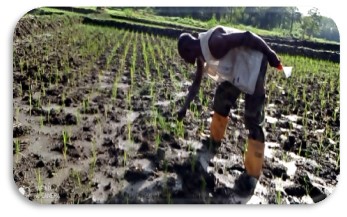 [August 2, 2022] The Community of Hope Agriculture (CHAP) in Liberia has extended operations in neighboring Mano River countries (Sierra Leone and Guinea). Together with Guinean partners, a new CHAP project, entitled "FEED La Guinea," has kicked off with SRI trial plots on two hectares in Kalako, Guinea, with over 100 smallholder farmers coming together to learn SRI methods. The effort in Guinea was initiated after the visit of Bishop Dr. Joseph Dore, President of Alliance des Eglises et Missions Evangeliques de Guinea (AEMEG) to Liberia SRI fields in December 2021. Robert S.M. Bimba, Director of CHAP, accepted the invitation and started operation in June; the first rice was transplanted July 15, 2022. CHAP sent one of its SRI experts, Jacob Fayiah Kengefi, to help layout the field, train farmers in SRI nursery management, and explain the SRI principles.
[August 2, 2022] The Community of Hope Agriculture (CHAP) in Liberia has extended operations in neighboring Mano River countries (Sierra Leone and Guinea). Together with Guinean partners, a new CHAP project, entitled "FEED La Guinea," has kicked off with SRI trial plots on two hectares in Kalako, Guinea, with over 100 smallholder farmers coming together to learn SRI methods. The effort in Guinea was initiated after the visit of Bishop Dr. Joseph Dore, President of Alliance des Eglises et Missions Evangeliques de Guinea (AEMEG) to Liberia SRI fields in December 2021. Robert S.M. Bimba, Director of CHAP, accepted the invitation and started operation in June; the first rice was transplanted July 15, 2022. CHAP sent one of its SRI experts, Jacob Fayiah Kengefi, to help layout the field, train farmers in SRI nursery management, and explain the SRI principles. Since the work began in Kalalo, Guinea, there has been good momentum among smallholder farmers to learn more about SRI (see Facebook video). The vision of feeding Guinea with home-grown rice is resonating with key stakeholders, including the Chairman of the National Transition Assembly, Religious Affairs and other actors. Most of the farming groups are women-dominated and eager to learn more about SRI for the first time. To ensure that what farmers produce is bought in a timely manner, CHAP is working on launching the “I love Guinea Rice” and “Feed la Guinea” campaigns to get a buy-in from consumers for local home-grown rice. [See article by Robert Bimba.]
- Community of Hope Agriculture Project (CHAP) Receives Grant to Produce Climate Smart Agriculture Seed Rice in Montserrado and Lofa Counties
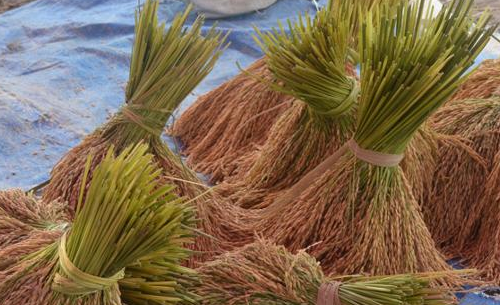 [February 3, 2022] A UNDP grant has been used to launch a commercial seed rice initiative, which is expected to increase local rice production and reduce reliance on rice imports.
According to an article in the Africa-Press.net website, the Community of Hope Agriculture Project (CHAP) received a grant of US$25,000 to produce climate smart agriculture seed rice in Montserrado and Lofa counties using SRI methods.
CHAP is one of eight organizations awarded with grants to develop innovative, sustainable and viable agricultural schemes that can boost
[February 3, 2022] A UNDP grant has been used to launch a commercial seed rice initiative, which is expected to increase local rice production and reduce reliance on rice imports.
According to an article in the Africa-Press.net website, the Community of Hope Agriculture Project (CHAP) received a grant of US$25,000 to produce climate smart agriculture seed rice in Montserrado and Lofa counties using SRI methods.
CHAP is one of eight organizations awarded with grants to develop innovative, sustainable and viable agricultural schemes that can boost 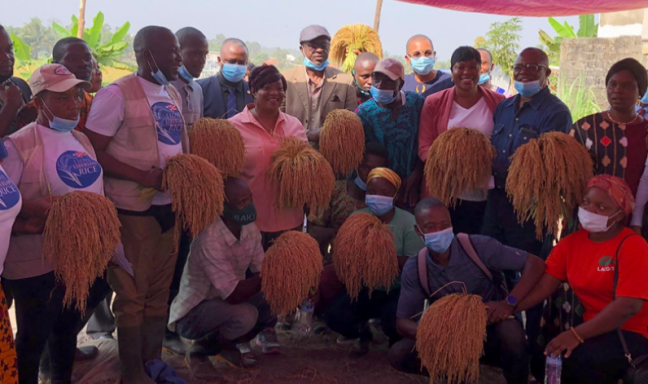 agricultural production. UNDP, in partnership with the Ministry of Commerce and Industry (MOCI), provided the grants and stewardship for the initiative.
On February 2, 2022, CHAP launched the commercial seed rice following a successful harvest in Montserrado County (see event video and event flyer).
agricultural production. UNDP, in partnership with the Ministry of Commerce and Industry (MOCI), provided the grants and stewardship for the initiative.
On February 2, 2022, CHAP launched the commercial seed rice following a successful harvest in Montserrado County (see event video and event flyer). According to the the article, agriculture sector in Liberia is largely undeveloped and with low yields due to limited access to affordable inputs and implements, among other factors. UNDP’s Livelihood and Employment Project, is a five-year initiative that seeks to engage poor and vulnerable people in socioeconomic activities that generate income and improve their livelihoods. It targets women, youth and persons living with disabilities who are often at the worst end of the economic ladder. [See complete article in Africa-Press.net and Dixon TV event video.]
2021
 Liberia Included in Four-Year Regional SRI-Based RICOWAS Project
Liberia Included in Four-Year Regional SRI-Based RICOWAS Project
[October 21, 2021] The Adaptation Fund (AF) has approved the “Scaling up Climate Resilient Rice Production in West Africa” (RICOWAS) project in October 2021. The four-year, $14 million effort, which emphasizes the System of Rice Intensification (SRI), is the largest regional project funded by the AF in Africa, covering thirteen ECOWAS countries. In Liberia, the Community of Hope Agriculture Project (CHAP) will be in charge of executing the project. The overall purpose of the initiative is to improve climate resilience and increase the productivity of the rice system of smallholder rice farmers in West Africa. Regionally, the Sahara and Sahel Observatory (OSS), will oversee the project overall implementation. The Rice Regional Center of Specialization, hosted by the Institute of Rural Economy (IRE) of Mali, will be in charge of the regional level execution and will work in partnership with the Climate Resilient Farming Systems program at Cornell University. [See OSS article for more information.]
2020
-
 CHAP's Marketing Program and SRI Success Featured on LNTV's Market Day Program
CHAP's Marketing Program and SRI Success Featured on LNTV's Market Day Program
[October 28, 2020] Robert Bimba was interviewed on LNTV's Market Day program about Community of Hope Agriculture Project's (CHAP) activities to help rice farmers to improve their capabilities produce and market their rice crop. This involves promotion of SRI, access to equipment, and development of business skills. CHAP currently works with over 15,636 farmers in ten counties of Liberia. The organization's nation-wide bumper rice harvest kicked off on October 24, in Klay, Bomi, at one of the Sustainable Integrated Agriculture sites which uses SRI under CHAP's Farm Business Investment Opportunities (FABIO) program. [See Market Day video clip for details. Bimba's interview begins at minute 17:00. Additional information about CHAP's SRI and other rice-related activities can be found on the CHAP website and Facebook page.]
-
 Rice Farming Continues during COVID-19 Crisis; Liberian Farmers Equate Health Precautions with SRI Principles
Rice Farming Continues during COVID-19 Crisis; Liberian Farmers Equate Health Precautions with SRI Principles
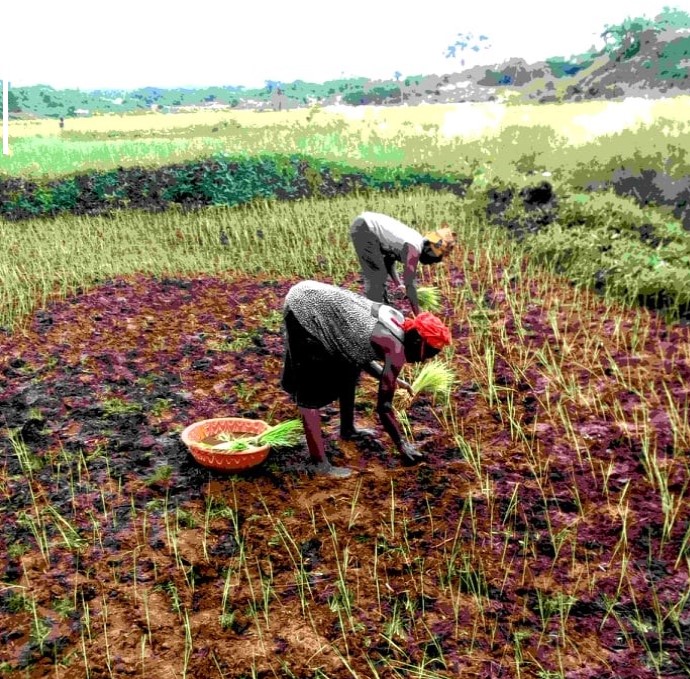 [May 15, 2020] Since the outbreak of the COVID-19 global health crisis is also affecting food security across Liberia and throughout Africa, the Community of Hope Agriculture Project (CHAP) initiated ways of keeping her out-grower scheme farmers under the “Rice Investment for Empowerment” (RISE) growing food during this crisis period in support of Government Liberia C-19 Food Security Plan through the Ministry of Agriculture, calling on everyone to grow something during the lockdown. According to Robert Bimba, the farmers supported by CHAP, who are located in Nimba, Grand Gedeh, Cape Mount, Montserrado, Lofa, Bong, and Bomi, were already engaged since last year and were at different levels with their farming activities at the onset of the health crisis.
CHAP is promoting SRI principles for growing rice under the current health crisis as was done during the Ebola crisis in 2014-2015 under the regional SRI-WAAPP program; CHAP continues supporting the farmers in Grand Gedeh, River Gee, and Montserrado.
An interesting development is that many farmers see the SRI principles as similar to the COVID-19 awareness messages as shown in the table below.
[May 15, 2020] Since the outbreak of the COVID-19 global health crisis is also affecting food security across Liberia and throughout Africa, the Community of Hope Agriculture Project (CHAP) initiated ways of keeping her out-grower scheme farmers under the “Rice Investment for Empowerment” (RISE) growing food during this crisis period in support of Government Liberia C-19 Food Security Plan through the Ministry of Agriculture, calling on everyone to grow something during the lockdown. According to Robert Bimba, the farmers supported by CHAP, who are located in Nimba, Grand Gedeh, Cape Mount, Montserrado, Lofa, Bong, and Bomi, were already engaged since last year and were at different levels with their farming activities at the onset of the health crisis.
CHAP is promoting SRI principles for growing rice under the current health crisis as was done during the Ebola crisis in 2014-2015 under the regional SRI-WAAPP program; CHAP continues supporting the farmers in Grand Gedeh, River Gee, and Montserrado.
An interesting development is that many farmers see the SRI principles as similar to the COVID-19 awareness messages as shown in the table below.
COVID 19 Awareness SRI Principle 1. Social Distance Wider spacing of plants (25cm x 25cm) 2. Frequent hand washing to reduce the spread of virus Alternative wetting and drying of field to enhance plant growth 3. Timely report all cases for isolation and treatment Uproot infected plants quickly 4. Observe exposed person for 14 days Transplant your seedling from 8-14 days 5. Avoid crowded places Transplant one plant per hill to reduce density 6. No touching and hand shaking No touching plants during flowering or pollination period 7.
Keep healthy by eating nutritious food
Improve soil health and eat the organic rice you grow
CHAP has also engaged the Ministry of Agriculture to make use of one of the four industrial rice mills in the Southeast of Liberia that are financed by African Development Bank under the Smallholder Agriculture Productivity Enhancement and Commercialization Project (SAPEC). If approved, this will boost rice production in the Southeast using the SRI methods to increase yields and double the crop cycle to twice a year. In an effort to ensure that what farmers produce is bought in a timely manner, CHAP, under the I love Liberian Rice initiative, has introduced the Farmers RISEpaymentApp; training will commence in two weeks and registration of the first 10,000 farmers across the RISE investment counties along with Lonestar MTN. This will enhance timely service delivery for inputs and payment for CHAP-supported farmers.
To make the opportunities of SRI more widely available within Liberia, the above efforts are intended to make farming a more profitable business for smallholder farmers. This investment initiative is aligned with the Government of Liberia’s Pro-Poor Agenda for Prosperity and Development (PPAPD). The System of Rice Intensification (SRI) is being promoted as an agroecological methodology that is an excellent example of Climate-Smart Agriculture. [See Robert Bimba's article that has additional information.]
2019 Updates
 Japan/FAO Project to Use
SRI for Seed Rice
Japan/FAO Project to Use
SRI for Seed Rice
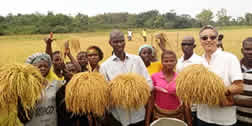 [December 31, 2019] According to an article in the Daily Observer,
a group of sixty-five farmers from the “Kwapaigei Farmers Development Cooperative Society (KFDCS)” harvested fifteen hectares of improved NERICA L-19, a short-duration, lowland rice variety that is grown in Liberia. The harvest, which took place in Panta District, Bong County, is assocated with the initiative “Integrated Sustainable Rice System Development in Liberia” for which the Government of Japan provided US$500,000 to FAO to support the Government of Liberia’s efforts in enhancing thecapacity of smallholder farmers to sustainably increase productivity and incomes. Targeting 1,500 beneficiaries, the project is strengthening the rice value chain in the two breadbasket counties; Bong and Lofa. In addition to strengthening the production capacity of smallholder producers, the project will construct also two post-harvest facilities.
FAO is working with the Ministries of Agriculture and Internal Affairs to ensure that the most urgent and needed support is provided to farmers in Bong and Lofa counties. During the next quarter, beneficiaries will carry out replanting of the farm with seed rice using the System of Rice Intensification (SRI). At the same time, FAO and partners will be facilitating the installation of agro-machinery and construction of post-harvest technology centers. Thereafter, capacities of farmers and other community members – especially youth – will be built on the use of agro-machines and management of the centers. [See complete Daily Observer article.]
[December 31, 2019] According to an article in the Daily Observer,
a group of sixty-five farmers from the “Kwapaigei Farmers Development Cooperative Society (KFDCS)” harvested fifteen hectares of improved NERICA L-19, a short-duration, lowland rice variety that is grown in Liberia. The harvest, which took place in Panta District, Bong County, is assocated with the initiative “Integrated Sustainable Rice System Development in Liberia” for which the Government of Japan provided US$500,000 to FAO to support the Government of Liberia’s efforts in enhancing thecapacity of smallholder farmers to sustainably increase productivity and incomes. Targeting 1,500 beneficiaries, the project is strengthening the rice value chain in the two breadbasket counties; Bong and Lofa. In addition to strengthening the production capacity of smallholder producers, the project will construct also two post-harvest facilities.
FAO is working with the Ministries of Agriculture and Internal Affairs to ensure that the most urgent and needed support is provided to farmers in Bong and Lofa counties. During the next quarter, beneficiaries will carry out replanting of the farm with seed rice using the System of Rice Intensification (SRI). At the same time, FAO and partners will be facilitating the installation of agro-machinery and construction of post-harvest technology centers. Thereafter, capacities of farmers and other community members – especially youth – will be built on the use of agro-machines and management of the centers. [See complete Daily Observer article.] Bomi, Cape Mount Farmers Adopt SRI
Bomi, Cape Mount Farmers Adopt SRI
[August 5, 2019] According to an article in the Daily Observer, a number of farmers in five communities in Bomi and Grand Cape Mount counties have adopted the System of Rice Intensification (SRI) practice to improve their yields. As a strategy to increase rice production in West Africa, the Community of Hope Agriculture Project (CHAP) is working with smallholder rice farmers in eight of the 15 counties to promote the SRI pr
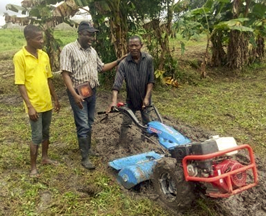 actice in order to improve the productivity of farmers in rice cultivation. In an interview with Judoemue Kollie, Madam Bowolo Sumo of the New Road United Women Agriculture Project in Tubmanburg relayed that that their harvests with the traditional method were small; they were impressed by SRI methodology and were encouraged to join CHAP to acquire new farming skills to improve their living conditions. “We have developed 78 plots with rice seedling using little amount of seeds, which was provided by CHAP,” she said, adding that every farm (family) in the group is entitled to a plot that is being developed during the farming season.
Her organization needs assistance with numerous challenges, including climate change, pest infestation, and the lack of power tiller to plough their field.
actice in order to improve the productivity of farmers in rice cultivation. In an interview with Judoemue Kollie, Madam Bowolo Sumo of the New Road United Women Agriculture Project in Tubmanburg relayed that that their harvests with the traditional method were small; they were impressed by SRI methodology and were encouraged to join CHAP to acquire new farming skills to improve their living conditions. “We have developed 78 plots with rice seedling using little amount of seeds, which was provided by CHAP,” she said, adding that every farm (family) in the group is entitled to a plot that is being developed during the farming season.
Her organization needs assistance with numerous challenges, including climate change, pest infestation, and the lack of power tiller to plough their field.  “I Love Liberian Rice” Campaign Launched
“I Love Liberian Rice” Campaign Launched
[April 29, 2019] The Community of Hope Agriculture Project (CHAP) in collaboration with authorities at the Ministry of Agriculture (MoA), launched the “I Love Liberian Rice Campaign” during April 2019 with the aim of improving food security in the country through rice production, processing and marketing. According to an article in the Daily Observer, the campaign was launched at the Paynesville City Hall, and brought together distinguished personalities, including officials of government, foreign nationals, private sector actors and
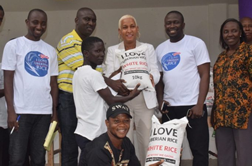 representatives of local farmers. Montserrado District #2 Representative, Jimmy Smith, who launched the campaign on behalf of the Vice President Jewel Howard-Taylor, expressed the government’s willingness to support CHAP to make the program a reality. He promised to purchase 200 bags of the rice produced by CHAP, as his contribution to promote the campaign. Paynesville City Mayor, Palm Belcher-Taylor, also lauded CHAP for the program, and pledged L$85,000 in support of the Campaign as well.
Mayor Belcher-Taylor said for any investment to be sustained, the people must take ownership. Therefore, “we encourage every Liberian to contribute to the campaign by making minimum contribution, because we want it extended to the U.S., Europe and Asia,” she told the participants. CHAP Executive Director, Robert Bimba, who provided the overview, recalled how Liberians, especially rural dwellers, are contributing to the rice campaign. According Bimba, the initiative aims at soliciting a volunteer contribution of US$1 from each individual, mainly those that are engaged into agriculture activities,“so that proceeds generated from the campaign will be used to purchase farming implements to empower smallholders’ farmers. As part of the initiative, Bimba said approximately, 5,000 smallholder farmers, mainly women, are expected to benefit from seed rice under the program this year. According to him, the distribution of seed rice has already begun with smallholder farmers in Bomi County, and is expected to be extended to other beneficiary counties.
Bimba said prior to the exercise, CHAP has taught the farmers with improved technology in the “System of Rice Intensification” to increase the production of rice.
“We will have 3,000 tons of milled rice by mid-July for the local and international markets. Liberians outside the country are highly encouraged to contributed to the success of this program,” he added. [See article in the Daily Observer for details.]
representatives of local farmers. Montserrado District #2 Representative, Jimmy Smith, who launched the campaign on behalf of the Vice President Jewel Howard-Taylor, expressed the government’s willingness to support CHAP to make the program a reality. He promised to purchase 200 bags of the rice produced by CHAP, as his contribution to promote the campaign. Paynesville City Mayor, Palm Belcher-Taylor, also lauded CHAP for the program, and pledged L$85,000 in support of the Campaign as well.
Mayor Belcher-Taylor said for any investment to be sustained, the people must take ownership. Therefore, “we encourage every Liberian to contribute to the campaign by making minimum contribution, because we want it extended to the U.S., Europe and Asia,” she told the participants. CHAP Executive Director, Robert Bimba, who provided the overview, recalled how Liberians, especially rural dwellers, are contributing to the rice campaign. According Bimba, the initiative aims at soliciting a volunteer contribution of US$1 from each individual, mainly those that are engaged into agriculture activities,“so that proceeds generated from the campaign will be used to purchase farming implements to empower smallholders’ farmers. As part of the initiative, Bimba said approximately, 5,000 smallholder farmers, mainly women, are expected to benefit from seed rice under the program this year. According to him, the distribution of seed rice has already begun with smallholder farmers in Bomi County, and is expected to be extended to other beneficiary counties.
Bimba said prior to the exercise, CHAP has taught the farmers with improved technology in the “System of Rice Intensification” to increase the production of rice.
“We will have 3,000 tons of milled rice by mid-July for the local and international markets. Liberians outside the country are highly encouraged to contributed to the success of this program,” he added. [See article in the Daily Observer for details.] CHAP is Developing a Roadmap for the Supply of Liberian rice to the Local Market
in Collaboration with Other Partners
CHAP is Developing a Roadmap for the Supply of Liberian rice to the Local Market
in Collaboration with Other Partners
[January 15, 2019] A Front Page Africa article reported on the work of Liberian entrepreneur, Reverend Robert Bimba, who stressed the need for Liberians to start feeding themselves with home-grown rice. Reverend Bimba, who is the head of says the group, the Community of Hope Agriculture Project (CHAP), is currently cultivating rice to supply the Liberian market adding that “for too long Liberians have lived on imported products including rice to survive”. CHAP is using System of Rice Intensification (SRI) for dry season farming as a climate smart innovation using less water. CHAP, which has implemented several projects for the Ministry of Agriculture, West Africa Productivity Program WAAPP/World Bank, WHH, and UNFAO has substantial expertise in the Liberian rice sector: It is the focal point organization on SRI in Liberia with support from IFAD, the World Bank, CNS-Riz (Mali), SRI-Rice (Cornell University, USA), and Abide in the Vine
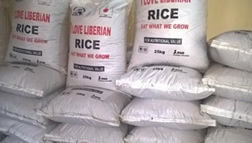 Fellowship Owego, NY, USA.
In the Front Page Africa article, Rev. Bimba said US$2 is million spent per annum on subsidizing projects and the US$200 million spent on the importation of rice can be invested in the rice sector.
He noted that more funding to the agriculture sector could provide job opportunities for young Liberians. CHAP currently has milling machines with a capacity of producing a minimum of 8 metric tons a day and in collaboration with other partners has begun developing a roadmap for the supply of Liberian rice to the local market.
“If we put our time and focus on eating our own rice and work towards promoting it, we will all start to feed ourselves from our own soul,” he said.
He called on all Liberians to join CHAP in the fight against hunger and invited the public to share in CHAP's large bumper SRI harvest. His Liberian milled rice now sells for US$20 /25kg for white rice and US$30/25kg for red rice. Bimba added Let's support each other and stop tearing [at] each other.” he noted. [For details, see Edwin Genoway Jr's FPA article.]
Fellowship Owego, NY, USA.
In the Front Page Africa article, Rev. Bimba said US$2 is million spent per annum on subsidizing projects and the US$200 million spent on the importation of rice can be invested in the rice sector.
He noted that more funding to the agriculture sector could provide job opportunities for young Liberians. CHAP currently has milling machines with a capacity of producing a minimum of 8 metric tons a day and in collaboration with other partners has begun developing a roadmap for the supply of Liberian rice to the local market.
“If we put our time and focus on eating our own rice and work towards promoting it, we will all start to feed ourselves from our own soul,” he said.
He called on all Liberians to join CHAP in the fight against hunger and invited the public to share in CHAP's large bumper SRI harvest. His Liberian milled rice now sells for US$20 /25kg for white rice and US$30/25kg for red rice. Bimba added Let's support each other and stop tearing [at] each other.” he noted. [For details, see Edwin Genoway Jr's FPA article.] CHAP Makes Presentation at the Ministry of Agriculture Extension Department
CHAP Makes Presentation at the Ministry of Agriculture Extension Department
[January 16, 2019] On January 11, 2019, Robert Bimba made a presentation at Liberia's Ministry of Agriculture Extension Department. An overview of CHAP and its activities and impact over the past decade was provided. CHAP, an SRI pioneer, has served as the focal point for SRI and SCI in Liberia since 2012 and is one of the main service providers for related projects under the MOA, World Bank, SRI-WAAP, IFAD, WHH, and FAO. CHAP provides advisory services and training focused on sustainable farming practices, introduces user-friendly labor-saving equipment, provides assistance with marketing and value chain development, and also works on appropriate water, sanitation and hygiene practices.
2018
 Much Progress with SRI in the Japanese Rice Grant Project
Much Progress with SRI in the Japanese Rice Grant Project
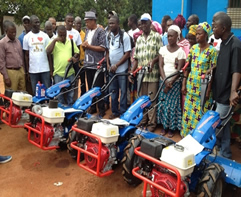 [December 20, 2018] In an effort to boost the agriculture sector of Liberia and improve food security in the country the Community of Hope Agriculture Project (CHAP) has worked for the past two years with over 9,000 farmers in five Ebola-affected counties in Liberia.
US$2 million was provided to Liberia by the Japanese Government through the International Fund for Agriculture Development (IFAD), which led to collaboration with the Ministry of Agriculture to design a project that would increase farmers’ incomes by developing the rice and cassava value chains in Liberia.
The Japanese Rice Grant, entitled ‘Economic recovery of Liberian rice farmers in Ebola affected counties’ worked in Bomi, Grand Cape Mount, Grand Bassa, Lofa and Montserrado.
The goal of the grant,which just concluded, is to empower poor farmers, particularly women (at least 60%), to overcome the impact of the Ebola crisis by increasing their food security, building a sustainable agricultural rice base, and improving their livelihood.
[December 20, 2018] In an effort to boost the agriculture sector of Liberia and improve food security in the country the Community of Hope Agriculture Project (CHAP) has worked for the past two years with over 9,000 farmers in five Ebola-affected counties in Liberia.
US$2 million was provided to Liberia by the Japanese Government through the International Fund for Agriculture Development (IFAD), which led to collaboration with the Ministry of Agriculture to design a project that would increase farmers’ incomes by developing the rice and cassava value chains in Liberia.
The Japanese Rice Grant, entitled ‘Economic recovery of Liberian rice farmers in Ebola affected counties’ worked in Bomi, Grand Cape Mount, Grand Bassa, Lofa and Montserrado.
The goal of the grant,which just concluded, is to empower poor farmers, particularly women (at least 60%), to overcome the impact of the Ebola crisis by increasing their food security, building a sustainable agricultural rice base, and improving their livelihood. The JICA Liberia office along with the Regional Head of JICA from Ghana also visited a few fields and saw the impact first-hand, including how farmers under CHAP continued to use SRI methods after the close of the project. Recently reporters, who visited the five counties in which CHAP has work, spoke with local farmers and county authorities concerning the impact of the Japanese Rice Grant and discovered there were more farmers now using SRI methods who explained how their harvest has increased significantly and how the labor saving devices distributed were still in use by the 131 farming communities. When interviewed, farmers said that it is the very first time they have ever seen and worked with farming equipment such as the rotary tiller and rotary weeder and that these have made a huge difference in their farming work. They noted that in years past they spent more energy and time to produce rice, but with the equipment and training they are now spending less time and energy in the production of rice. [See full article on the impact of the Japanese Rice Grant.]
 Robert Bimba Represents Liberia at 7th CARD GM and CARD High-Level Meeting held in Tokyo, Japan
Robert Bimba Represents Liberia at 7th CARD GM and CARD High-Level Meeting held in Tokyo, Japan
[October 8, 2018] The Coalition of African Rice Development (CARD), an initiative established in 2008 after the global food crisis, held a meeting in Tokyo, Japan. As CARD’s 1st phase has ended, the meeting was about sharing the successes and lessons learned and finding a way forward for 2019-2030 to support the doubling of rice production. CHAP, a beneficiary of JICA training program in Japan and the Philippines from 2014 to 2017, serves as a leader of the Rice Sector and has worked with CARD/NRDS as a facilitator in support of Liberia’s rice sector. [CHAP currently serves as the focal organization for promotion of SRI in Liberia under the regional WAAPP project and it is one of the implementing partners of the ongoing Japanese Rice Grant in Liberia through IFAD and MOA since 2016.] CHAP participation in the recently-ended CARD GM was very important in sustaining the gains made and considering how to ensure there is a private-sector window to scale up CARD and rice programs in Liberia. The meeting brought together 32 Sub-Saharan African (SSA) countries with representatives from JICA, AGRA, Africa Rice, Government of Japan, IFAD, World Bank, WFP, NEPAD, etc. The CARD structure has three levels: CARD member countries; steering committee members who are donors, universities and others; and a secretariat. The CARD member country group, which constitutes the highest decision-making body, was able to approve the CARD 2nd phase framework at the recently-ended meeting. Liberia was represented by Rev. Robert S.M. Bimba, Executive Director of CHAP and SRI Focal Point, and Dr. Joseph Sesay of MOA. Major outcomes of the CARD 2nd phase strategy approach were made regarding the rice strategy approach included an emphasis on on resilience, industrialization, competitiveness, and empowerment (including women and youth) [For details, see October CHAP Newsletter.]
2017
 Three-Day Training for SRI Technicians the Japanese Rice Grant Project Held
Three-Day Training for SRI Technicians the Japanese Rice Grant Project Held
[March 9, 2017] Community of Hope Agriculture Project (CHAP) has completed a training of trainers exercise for six System of Rice Intensification Technicians (SRI Technicians) conjunction with the the Japanese Rice Grant Project. The event also included an agronomist, a monitoring and evaluation officer, an accountant, and other program staff to help expand their understanding SRI. The training included practice with the BCS 732 tractor (for land preparation) and the Garden Weasel (for weeding) in order to enhance trainers' capacities to work with the farmers in the field. The three-day training was held in both Foya Lofa County and at the Community of Hope Agriculture Project (CHAP) Office, Zubah Town, Liberia.
 CHAP to Implement Japanese Rice Grant Project for Economic Recovery in Five Ebola-Affected Counties
CHAP to Implement Japanese Rice Grant Project for Economic Recovery in Five Ebola-Affected Counties
[January 15, 2017] The Community of Hope Agriculture Project (CHAP) was selected to implement the "Japanese Rice Grant Project," which is part of a two million USD grant provided to Liberia by the Japanese government to help achieve economic recovery of Liberian rice farmers in Ebola-affected counties. The eighteen month project will involve 1,800 lowland rice farmers (1 hectare per farmer on 1800 hectare) in
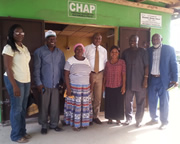 Lofa and five counties (Grand Bassa, Bomi, Grand Cape Mount, and Montserrado) and is financed by the Japanese and Liberian governments through the Ministry of Agriculture (MOA) and International Fund for Agriculture Development (IFAD). The project will help farmers learn about and adapt SRI on their own farms, introduce labor-saving devices (power tillers / weeders), and promote the rice value chain by building the capacity of entrepreneurs (out-growers, processors, off-takers and marketers). The trainings and equipment should result in improved productivity (rice quality as well as quantity),
increased farmer income, and an expanded cycle of rice production and processing in the target areas.
Lofa and five counties (Grand Bassa, Bomi, Grand Cape Mount, and Montserrado) and is financed by the Japanese and Liberian governments through the Ministry of Agriculture (MOA) and International Fund for Agriculture Development (IFAD). The project will help farmers learn about and adapt SRI on their own farms, introduce labor-saving devices (power tillers / weeders), and promote the rice value chain by building the capacity of entrepreneurs (out-growers, processors, off-takers and marketers). The trainings and equipment should result in improved productivity (rice quality as well as quantity),
increased farmer income, and an expanded cycle of rice production and processing in the target areas. There have been several productive meetings and exchanges held during the onset of the project with CHAP, IFAD, the Central Agricultural Research Institute (CARI), Africa Rice, and others in support of the project (- see photo with representatives of these groups at right). In addition to these groups and the Governments of Japan and Liberia, CHAP has support from the World Bank, CNS-Riz (Mali), and SRI-Rice (Cornell University) to implement the Japanese Rice Grant project.
2016
 Robert Bimba Gives Presentations at Cornell University
Robert Bimba Gives Presentations at Cornell University
[June 15, 2016] Robert Bimba, Executive Director of the Community of Hope Agricultural Project (CHAP) and Liberia's SRI National Facilitator, made a presentation about the history and progress of SRI in Liberia on June 14 (see PowerPoint). He was in New York during June to visit the Abide in the Vine Fellowship Church in Owego and to meet with SRI-Rice in Ithaca. Six members of the Owego church that support Bimba's agricultural work also came to Cornell to have discussions on supporting CHAP and the SRI work in Liberia. They are currently supporting the development and acquisition of rototillers and weeders that CHAP is using in its SRI extension. A video with information on how Liberian farmers can access the SRI equipment (Power tillers and rice weeders) is available on the SRI-Rice YouTube channel.
 SRI Training Sites Expanded Under SRI-WAAPP and CHAP
SRI Training Sites Expanded Under SRI-WAAPP and CHAP
- [May 20, 2016] SRI continues to expand in the areas of Liberia where rice is cultivated, as can be seen in the SRI-WAAPP Liberia site map to the right. The map, which is current as of 2016, shows 25 sites where farmers have received training in SRI since the project formally began in 2014. SRI-WAAPP has worked closely with the Community for Hope Agriculture Project (CHAP) and the SRI National Facilitator, Robert Bimba.
2015
 Three-Day SRI Seminar for Anglophone West African Countries Takes Place in Monrovia
Three-Day SRI Seminar for Anglophone West African Countries Takes Place in Monrovia
[June 25, 2015] During a three-day SRI conference for English-speaking West African countries, Dr. Gaoussou TRAORE, Regional Project Coordinator of the System of Rice Intensification (SRI) under the West Africa Agricultural Productivity Project (WAAPP), commended Liberia for leading the program that is being implemented by WAAPP. According to an article on the Owoko website, Anglophone countries in the West African sub-region completed a three-day experience-sharing seminar on SRI at the Balla Casa hotel in Monrovia, Liberia. The event, held June 22-24, was attended by representatives from West Africa Agriculture Productivity Programme (WAAPP) implementing countries, local SRI champions and focal research scientists on SRI. Participants from Gambia, Ghana, Liberia, and Sierra Leone traveled to Monrovia to share national experiences as well as learning from Liberia who has maximized the potentials with using SRI methods. The meeting was also meant to strengthen regional cooperation and experience sharing among WAAPP implementing countries in their effort to scale up the SRI planting method in West Africa. (For more information on the WAAPP SRI program, which is coordinated by CNS-RIZ/IER in Mali and backstopped by SRI-Rice at Cornell University, see the project website. See also article in the Daily Observer.)
 National Workshop on the System of Rice Intensification Held in Monrovia
National Workshop on the System of Rice Intensification Held in Monrovia
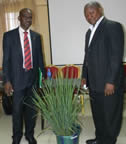 [February 15, 2015] According to press release by the Ministry of Agriculture of the Republic of Liberia, the Community of Hope Agriculture Project (CHAP) hosted a National Workshop on the System of Rice Intensification (SRI) from February 12-13, 2015, at the Corina Hotel in Monrovia. The theme of the event was "Improving and Scaling-up the System of Rice Intensification in West Africa," which is also the name of the project sponsored by the West Africa Agricultural Productivity Program (WAAPP). Honorable Fofi Bimba, Chairman of the Agriculture Committee at the Lower House of the Liberian Parliament, and Dr. Abimbola A. Adubi, World Bank Co Task Team Leader to Liberia, both shown in photo at right, addressed participants of the workshop.
[February 15, 2015] According to press release by the Ministry of Agriculture of the Republic of Liberia, the Community of Hope Agriculture Project (CHAP) hosted a National Workshop on the System of Rice Intensification (SRI) from February 12-13, 2015, at the Corina Hotel in Monrovia. The theme of the event was "Improving and Scaling-up the System of Rice Intensification in West Africa," which is also the name of the project sponsored by the West Africa Agricultural Productivity Program (WAAPP). Honorable Fofi Bimba, Chairman of the Agriculture Committee at the Lower House of the Liberian Parliament, and Dr. Abimbola A. Adubi, World Bank Co Task Team Leader to Liberia, both shown in photo at right, addressed participants of the workshop.
2014
 CHAP Carries Out SRI Pilot Project with Ministry of Agriculture and WAAPP Liberia
CHAP Carries Out SRI Pilot Project with Ministry of Agriculture and WAAPP Liberia
[September 10, 2014] Despite the ongoing Ebola crisis in Liberia, the Ministry of Agriculture through WAAPP Liberia and the lead organization CHAP continues to accelerate agricultural adoption and dissemination of SRI in River Gee and Grand Gedeh, with eight additional counties to
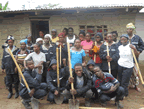 follow. Scaling up of rice production is being led by the farmers themselves. (Click on photo at left to enlarge.) The pilot project is part of the 3-year regional project "Developing and Scaling Up the System of Rice Intensification (SRI) in West Africa" that was launched in July/August 2013. (See first quarterly report for details of Liberia pilot activities during May-August, 2014).
follow. Scaling up of rice production is being led by the farmers themselves. (Click on photo at left to enlarge.) The pilot project is part of the 3-year regional project "Developing and Scaling Up the System of Rice Intensification (SRI) in West Africa" that was launched in July/August 2013. (See first quarterly report for details of Liberia pilot activities during May-August, 2014).The pilot in Liberia began during May 2014 with seven staff hired to implement the project for an initial period of eleven months. Some of accomplishments so far include a baseline survey farmer knowledge about SRI practices, signing of MOU with all SRI farmers, training of technicians and farmers on SRI, distribution of tools on pay back plan, developing/airing of SRI radio and TV spots, and participation in the Regional SRI Training of Trainers in Togo 2014. The project has recruited 177 farmers in the six districts of River Gee and Grand Gedeh along with government agriculture staff, WAAPP Focal Persons and other local persons. Finally, CHAP held an SRI field day with 200+ people on May 9, 2014, that was attended by the H.E. Ellen Johnson Sirleaf, President of Liberia, Hon. Dr. Florence Chenoweth, Minister, MOA, and other dignitaries. (See item below for more information on the field day and quarterly report for additional details on the pilot).
 President Ellen Johnson-Sirleaf Attends Harvest of SRI-Grown Rice at CHAP
President Ellen Johnson-Sirleaf Attends Harvest of SRI-Grown Rice at CHAP
[May 13 and July 21, 2014] President Ellen Johnson-Sirleaf encouraged Liberians to return to the soil and engage in agriculture and food production while attending a ribbon-cutting ceremony for the harvesting of three hectares Nerica rice planted by the Community of Hope Agriculture Project (CHAP) in Zubah Town. She noted that the introduction of the SRI is one of the many methods the Ministry of Agriculture is employing to increase rice production and CHAP has been the institution that has been using this method very successfully. She congratulated CHAP for continuing to grow, saying that many times people come up with brilliant ideas and begin projects but they never last. However, "CHAP has been doing this year after year, so let’s commend them for that," she told the audience.
Liberia's Agriculture Minister, Dr. Florence Chenoweth, praised CHAP as one of the Ministry’s success stories. A representative of the West Africa Agriculture Productivity Program (WAAPP) assured CHAP of its support in all endeavors, saying, "Our intervention in Grand Gedeh and River Gee is not the end. We will support you in the western region, the eastern region and all of our counties of intervention." [See New Dawn article on AllAfrica website for details.] The month her visit to CHAP, she arranged for a group of 100 young people to work with CHAP in order to interest them in agriculture, help out CHAP's SRI efforts, and empower them earn incomes through the president's initiative.
 Visit to Paynesville, Monrovia, Records Newfound Enthusiasm for SRI
Visit to Paynesville, Monrovia, Records Newfound Enthusiasm for SRI
[March 3, 2014] During Erika Styger's visit to Liberia in late February 2014, a number of people at the Community of Hope Agriculture Project
 (CHAP) shared their SRI experiences. A video of Robert Bimba, national coordinator for the Farmer Union Network (FUN) of Liberia, describes how SRI first came to Liberia when he and his family and a few farmers on their family farm in Zubah Town, Paynesville, Monrovia, began SRI trials in late 2012. After the first year, his family and the farm employees were all very satisfied with the performance of the SRI plots. In fact, rice production at that point did not seem profitable anymore and the family debated whether to stop rice production and grow vegetables. The SRI performance turned this notion upside-down, and the family decided to continue with SRI on their land. Other SRI video interviews from the field visit include: An SRI farmer in Liberia, a Central Agricultural Research Institute researcher, a very convincing interview with Elizabeth Bimba on SRI and Sam Bimba talking about the CHAPS SRI plots. The CHAP also tested several weeders, one of which is shown in the photo at left (see also weeder video).
(CHAP) shared their SRI experiences. A video of Robert Bimba, national coordinator for the Farmer Union Network (FUN) of Liberia, describes how SRI first came to Liberia when he and his family and a few farmers on their family farm in Zubah Town, Paynesville, Monrovia, began SRI trials in late 2012. After the first year, his family and the farm employees were all very satisfied with the performance of the SRI plots. In fact, rice production at that point did not seem profitable anymore and the family debated whether to stop rice production and grow vegetables. The SRI performance turned this notion upside-down, and the family decided to continue with SRI on their land. Other SRI video interviews from the field visit include: An SRI farmer in Liberia, a Central Agricultural Research Institute researcher, a very convincing interview with Elizabeth Bimba on SRI and Sam Bimba talking about the CHAPS SRI plots. The CHAP also tested several weeders, one of which is shown in the photo at left (see also weeder video). SRI-Rice Supports National SRI Program in Liberia
SRI-Rice Supports National SRI Program in Liberia
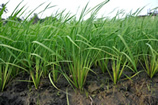 [March 2, 2014] Under the regional project Improving and Scaling up SRI in West Africa, Erika Styger visited Liberia, from Feb 22 - March 2, 2014, to provide program support to the newly initiated national SRI program under WAAPP Liberia. Styger was interacting with programs active in the rice sector (through the Ministry of Agriculture, Oxfam, USAID funded projects among others), visited field sites for first SRI implementation (with farmers and at research station of Central Agricultural Research Institute), and provided a one-day practical training to farmers and technicians. An Agriculture Coordination Committee Meeting about SRI held at the Ministry of Agriculture, in Gardnerville, Monrovia, registered 48 people in attendance from Government, multi-lateral and bilateral partnerships, donors, NGOs, farmer organization and the private sector. A presentation, System of Rice Intensification (SRI): Opportunities for Liberia, was given by Styger at the meeting.
[March 2, 2014] Under the regional project Improving and Scaling up SRI in West Africa, Erika Styger visited Liberia, from Feb 22 - March 2, 2014, to provide program support to the newly initiated national SRI program under WAAPP Liberia. Styger was interacting with programs active in the rice sector (through the Ministry of Agriculture, Oxfam, USAID funded projects among others), visited field sites for first SRI implementation (with farmers and at research station of Central Agricultural Research Institute), and provided a one-day practical training to farmers and technicians. An Agriculture Coordination Committee Meeting about SRI held at the Ministry of Agriculture, in Gardnerville, Monrovia, registered 48 people in attendance from Government, multi-lateral and bilateral partnerships, donors, NGOs, farmer organization and the private sector. A presentation, System of Rice Intensification (SRI): Opportunities for Liberia, was given by Styger at the meeting. Regional Project to Scale Up SRI Formally Launched
Regional Project to Scale Up SRI Formally Launched
[January 1, 2014] As one of 13 participating countries in the World Bank-financed regional project "Improving and Scaling up the System of Rice Intensification in West Africa" (SRI-WAAPP) that formally began in January 2014, Liberia participates in the project in regional workshops, trainings and meetings is undertaking nationally funded SRI activities through the WAAPP. Part of the larger and on-going West Africa Agricultural Productivity Program (WAAPP), SRI-WAAPP grew out of demands for technical and training assistance in SRI from most of the 13 countries, which resulted in a commissioned project development with an initial regional workshop to design the project in Ouagadougou, Burkina Faso in July 2012. The first phase of the project is running from January 2014 – June 2016. For more information about the SRI-WAAPP project view the project website and the project brochure. The project's Regional Coordination Unit is a partnership between Mali's National Center of Specialization in Rice (CNS-Riz) who houses the regional coordinator and SRI-Rice as the technical and strategic partner for this project, The SRI-WAAPP National Facilitator for Liberia is Robert Bimba, based at Community of Hope Agriculture Project (CHAP). For more about SRI activities in Liberia through the SRI-WAAPP project, visit the project's Liberia page. Since the project's initial planning workshop in 2012, Liberia has participated in the numerous regional workshop (see reports for the various national and regional SRI-WAAPP activities).
2012-2013
 First National SRI Workshop on SRI Takes Place in Margibi County
First National SRI Workshop on SRI Takes Place in Margibi County
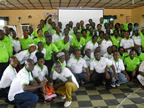 [December 20, 2013] The First National System of Rice Intensification (SRI) Trainers of Trainers Workshop, a three-day event took place in Kakata, Margibi County. The workshop, which began on December 17, 2013, brought together 84 participants from different parts of Liberia, as well participants from Sierra Leone and Mali. WAAPP Liberia Coordinator, Cyrus Saygbe, Sr., said the purpose of the workshop was to introduce the System of Rice Intensification in Liberia. The principal technical trainer was Daniel Saidu from Sierra Leone, who was trained by SRI-Rice in May 2013 and undertook SRI trials in Sierra Leone since 2012. Dr Gaoussou Traoré, coordinator of the regional program also participated. Representatives from more then a dozen institutions (government, NGOs, multilateral and bilateral projects, private sector) participated next to farmer leaders. Fifty participants, one third or which were women, came from all 15 counties in Liberia.
[December 20, 2013] The First National System of Rice Intensification (SRI) Trainers of Trainers Workshop, a three-day event took place in Kakata, Margibi County. The workshop, which began on December 17, 2013, brought together 84 participants from different parts of Liberia, as well participants from Sierra Leone and Mali. WAAPP Liberia Coordinator, Cyrus Saygbe, Sr., said the purpose of the workshop was to introduce the System of Rice Intensification in Liberia. The principal technical trainer was Daniel Saidu from Sierra Leone, who was trained by SRI-Rice in May 2013 and undertook SRI trials in Sierra Leone since 2012. Dr Gaoussou Traoré, coordinator of the regional program also participated. Representatives from more then a dozen institutions (government, NGOs, multilateral and bilateral projects, private sector) participated next to farmer leaders. Fifty participants, one third or which were women, came from all 15 counties in Liberia. The event was organized by the Ministry of Agriculture, in collaboration with the West Africa Agricultural Productivity Program (WAAPP) and the Community of Hope Agriculture Project (CHAP), with funding from the World Bank. In an article in the New Dawn, Rev. Robert Bimba, who was instrumental in planning the workshop, noted that the program was meant to maximize production and profit for farmers, as well as to minimize cost. The intent of the meeting was also to train people who will be able to return to their various localities and train others about the SRI. [see workshop agenda for more information on the workshop content.]
 First SRI Trials in Liberia Follow West Africa SRI Workshop in Ouagadougou, Burkina Faso
First SRI Trials in Liberia Follow West Africa SRI Workshop in Ouagadougou, Burkina Faso
[July 2012] Representatives from Liberia attended the West Africa SRI Workshop in Ouagadougou, Burkina Faso on July 26-27, 2012. According to Rev. Robert Bimba, who attended the training, SRI was first practiced in Liberia after the Burkina Faso training by members of the Community of Hope Agriculture Project (CHAP) project in Zubah Town, Duport Road, Paynesville.
Reports and Articles
- LAEJN staff. 2025. CHAP, AFL partner to revitalize military agriculture—Pilot rice project shows strong early results. Liberia Agricultural and Environmental Journalists Network (LAEJN) Network website. November 20.
- 2025. Liberia: Rivercess and Grand Bassa farmers urge CHAP, Concern Worldwide to sustain agriculture project
. Front Page Africa. June 23. - 2025. Bomi, Nimba, and Montserrado Commit Land for Rice Production Boost under RICOWAS Project. Promedia TV Liberia, Facebook. March 5.
- Yates, David A.. 2025. BCC, CHAP seal agreement to enhance agricultural training and research, Daily Observer. March 28. [CHAP to help Bomi Community College (BCC) add practical SRI and SCI experience and incorporate SRI into curriculum in Liberia.]
- Bimba, Robert. 2024. SRI Impact in the LIFE Project. SRI-Rice website, Liberia page. July 31.
- Kollie, Judoemue. 2024. Liberia: CHAP promotes urban, peri-urban agriculture. Daily Observer, March 25.
- 2023. From solar farm to table, in Liberia improved solar powered irrigation practices are securing lowland rice production. UN Cimate Technology Centre &Network (CTCN) website. September 1. [SRI included in CTCN solar-powered irrigation project]
- Bimba, Robert S.M. 2022. CHAP embarks on System of Rice Intensification (SRI) program in Guinea. July 27. SRI-Rice website, Guinea page. July 27. (2p pdf) [Description of the Liberia-based NGO CHAP's new SRI collaboration in Guinea.]
- 2022. Climate Smart Agriculture (CSA) in Liberia fact sheet. Ministry of Agriculture (Liberia) website. [Liberian CSA fact sheet includes SRI among other CSA methods/technologie adopted by smallholder farmers in Grand Bassa, Rivercess and Sinoe Counties in Liberia.]
- Africa-Press – Liberia. 2022. UNDP grant recipient launches climate smart seed rice for Liberia, Africa-Press.net, February 3.
- Kollie, Judoemue. 2020. Farmers remain focused on SRI techniques amid COVID-19. Daily Observer. May 25
- Kollie, Judoemue. 2019. Japan, through FAO, enhances smallholder farmers’ productivity. Daily Observer. December 31. [Under the initiative, “Integrated Sustainable Rice System Development in Liberia”, the Government of Japan provided US$500,000 to FAO) to support Liberia’s efforts help smallholder rice production.]
- Kollie, Judoemue. 2019. Bomi, Cape Mount farmers adopt SRI. Daily Observer. August 5.
- Kollie, Judoemue, 2019. “Love Liberian Rice” campaign launched. Daily Observer. April 29.
April 29, 2019, Liberian Observer (Liberia) [Also available on AllAfrica site] - Genoway Jr., Edwin G. 2019. Liberian rice company closing gap on imported rice Front Page Africa, January 15. [CHAP promotes rice self-sufficency and SRI for Liberia]
- Bimba, Robert. 2018. CHAP Newsletter on 7th CARD GM and CARD High-Level Meeting held in Tokyo, Japan, October 2-5, 2018. October 8.
- Bimba, Robert. 2018. Japanese Government Rice Grant impact in Liberia continues on after the close of the project implemented by CHAP. October 8. (3p. pdf)
- 2018. Japanese Gov’t Rice Grant Makes Impact In Liberia. New Republic. October 10.
- Wiakanty, Simeon S. 2018. CHAP develops roadmap for non-stop rice supply. Daily Observer, February 6.
- 2017. CHAP strengthens local farmers combat food insecurity, New Republic, November 1. [$500,000 for rice production equipment donated to Liberian SRI farmers through Japanese Rice Grant Project.]
- Menjor, David S. 2017. CHAP trains Bomi farmers in SRI technology. Daily Observer, April 17.
- 2017. Liberia: Chap strengthens technicians' skills. AllAfrica, March 9. [J-Rice Project 3-day training in Foya Lofa County and at CHAP Office in Zubah, Liberia]
- Bimba, Robert. 2017. The Japanese Rice Grant Project: Economic recovery of Liberian rice farmers in Ebola-affected counties --Status report November 2016 – January 15, 2017. SRI-Rice website. (Report of a rice project financed by the Japanese Govt. to extend rice production in five counties in Liberia) [uploaded January 18, 2017]
- Roberts, Michael. 2016. “Go beyond production” - IFAD President on value addition for agribusiness. Capitol Times Online, August 8. [IFAD pres. Dr. Kanayo F. Nwanze visited the CHAP SRI project in Liberia]
2016, Capitol Times Online (Liberia) - 2015. Sierra Leone news: WAAPP Sierra Leone on sub-regional SRI champions experience sharing in Liberia. Owoko June 25.
- Harmon, William Q. and Gloria T. Tamba. Liberia leading in WAAPP's SRI rice production. Daily Observer, June 24.
- 2015. Government of Liberia Needs to Empower Farmers to Boost Rice Production, Says Lawmaker. Oryza, June 23.
- MOA. 2015. Community of Hope Agriculture Project (CHAP) hosts National Workshop on the System of Rice Intensification (SRI). Ministry of Agriculture of the Republic of Liberia website. February 15.
- Styger, Erika. 2014. SRI-Rice Trip Report February 22nd - March 2nd, 2014 Republic of Liberia. SRI-WAAPP Liberia web page.
- CHAP. 2014. Pilot project on the System of Rice Intensification: Inception and first quarterly report May - August 2014. SRI West Africa website. [Report on the Ministry of Agriculture/ WAAPP Liberia pilot project in Liberia to accelerate agricultural adoption and dissemination of SRI through the lead organization Community Hope Agriculture Project (CHAP)].
- 2014. Liberian President Ellen Johnson-Sirleaf attends SRI field day, endorsing SRI for national food security. SRI-WAAP website. May 14.
- Kollie, Judoemue Mohmoh. 2014. President Sirleaf initiates farm jobs for 100 youth. Daily Observer, July 21. [Note: Sirleaf's said youth should return to farming in a May 13 visit to CHAP.].
- Juduh, Rewina. 2014. Ellen calls for agriculture, food production Farmer’s organization receives support, for SRI practice in Liberia. The New Dawn (reposted in AllAfrica), May 13.
- Kollie, Judoemue Mohmoh. 2014. Farmer’s organization receives support, for SRI practice in Liberia. Daily Observer, March 6.
- 2014. Liberia hosts first national SRI Training of Trainers (ToT). SRI-WAAP website. January 5.
- Kollie, Judoemue Mohmoh. 2013. National ToT workshop on SRI practices ends in Kakata. Daily Observer, December 22.
- Singebh, Ramsey N. 2013. Margibi Hosts Rice Intensification Workshop. The New Dawn, 20 December. [reposted in AllAfrica]
- Kollie, Judoemue Mohmoh. 2013. Farmers to adopt new method for rice production. Daily Observer, December 18.
- CHAP. 2013. Final Report on the SRI TOT Workshop. SRI-WAAPP website.
Workshops
- National Workshop on the System of Rice Intensification (SRI)
Theme: Improving and Scaling-up the System of Rice Intensification in West Africa
Date: February 12-13, 2015; Venue: Corina Hotel in Monrovia. "Improving and Scaling-up the System of Rice Intensification in West Africa
Host: The Community of Hope Agriculture Project (CHAP) - First National SRI Trainers of Trainers Workshop
The workshop, which had 70 participants, was intended to implement the regional SRI commissioned project in Liberia for innovative practices. Training materials were provided by SRI-Rice for this event. Participants were from Liberia, Mali and Sierra Leone.
Date: December 16-19, 2013; Venue: Kakata, Margibi County, Liberia; Organized by: Community of Hope Agriculture Project (CHAP)
Sponsors: West Africa Agricultural Productivity Program (WAAPP) - Liberia, Ministry of Agriculture (MoA) and the Japanese Government
Host: Ministry of Agriculture; More Information: contact Robert Bimba. Click here to view the final report on the workshop.
Presentations
- Bimba, Robert. 2019. 1901 - Community of Hope Agriculture Project Update to Liberia MOA 2019. 19 slides. Presentation at the Ministry of Agriculture, Liberia, January 11. [uploaded January 17, 2019]
- Bimba, Robert. 2016. Community of Hope Agriculture Project (CHAP) - SRI in Liberia. 15 slides. PowerPoint presentation at the SRI-Rice Seminar Series, Cornell University, Ithaca, New York, June 14.
- Styger, Erika. 2014. System of Rice Intensification (SRI): Opportunities for Liberia. 30 slides. PowerPoint presentation for the Agriculture Coordination Committee (ACC), Ministry of Agriculture, Monrovia, Liberia on February 17.
- 2013. Liberia Presentation. Powerpoint by Central Agricultural Research Institute, Ministry of Agriculture, and Farmer Union Network (FUN) of Liberia presented at the West Africa SRI Workshop in Ouagadougou, Burkina Faso on July 26-27, 2012. 8 slides.
Videos
- 2022 (February 2). Community of Hope Agriculture (CHAP) Presents "Liberian Seed Rice and Business Harvest" Official Ceremony. 1:48:20 min. Video of event held Feb. 2, 2022, at Duport Road Zubah town. Dixon TV Facebook page.
- 2020 (October 28). Market Day October 28, 2020 Edition. 53:34 min. (SRI section begins at min 17:00). LNTV LIBERIA Live channel, Youtube. [LNTV interview with Robert Bimba, CHAP director in Liberia. He discusses his work with his SRI and marketing programs.]
- 2018 (December 28). LNTV TV clip supporting CHAP's rice program. 1:25 min. Robert Bimba facebook page. [LNTV TV clip from Liberia featuring CHAP SRI farmers requesting goverment help.]
- 2018 (December 28). LNTV TV clip: Robert Bimba describing CHAP's rice program. 1:25 min. Robert Bimba facebook page. [LNTV TV clip from Liberia featuring Robert Bimba requesting goverment and donor help for CHAP.] 2017. Liberia boosts its rice production. 4:47 min. Marketplace Africa section, CNN videos. [TV CNN video about rice marketing in Liberia. SRI section on CHAP begins at minute 2:09.]
- 2016 (June 14). Liberia - Machines for SRI. 1:18 min. SRI-Rice channel, YouTube. [Information on CHAP's project in Liberia to make available to the public power tillers and rice weeding tools.]
- 2015 (April 6). CHAP TV Spot: SRI in Liberia. 1:33 min. SRI-Rice channel, YouTube.
- 2014 (March 14). SRI Farmer in Liberia. 2:32 min. SRI-Rice Channel, YouTube. [A rice farmer in Liberia talks about his experience on farming with SRI techniques.]
- 2014 (March 14). CARI Researchers in Liberia. 3:37min. SRI-Rice Channel, Youtube. [Researchers from CARI, Central Agricultural Research Institute, talk about SRI experience in Liberia]
- 2014 (March 14). Sam Bimba talks about the CHAPS SRI plots in Liberia. 4:16 min. SRI-Rice Channel, Youtube.
- 2014 (March 7). Single row manual weeder demo in Liberia. 0:19 min. SRI-Rice Channel, YouTube. [ A weeder sent to Liberia from the USA for trials with the System of Rice Intensification.]
- 2014 (March 7). Interview with Elizabeth Bimba on SRI (Liberia). 2:39 min. SRI-Rice Channel, Youtube. [Elizabeth Bimba talks about how and why she is adopting the System of Rice Intensification (SRI) in Zubah Town, Paynesville, Monrovia, Liberia]
- 2014 (March 7). Interview with Robert Bimba on SRI in Liberia. 5:24 min. SRI-Rice Channel, Youtube. [Video statement by Robert Bimba, National coordinator for the Farmer Union Network (FUN) of Liberia, who learned about SRI during the SRI West workshop in Burkina Faso in July 2012]
- 2012 (August 22). First West Africa SRI Workshop (Ouagadougou, Burkina Faso): Robert Bimba, Liberia. 1:21 min. SRI-Rice Channel, Youtube. [Robert Bimba talks about his aspirations to introduce SRI into Liberia after the workshop.]
Photos
- The SRI-Rice Liberia Photo Collection contains photographs of SRI fields taken in Liberia provided by Erika Styger

